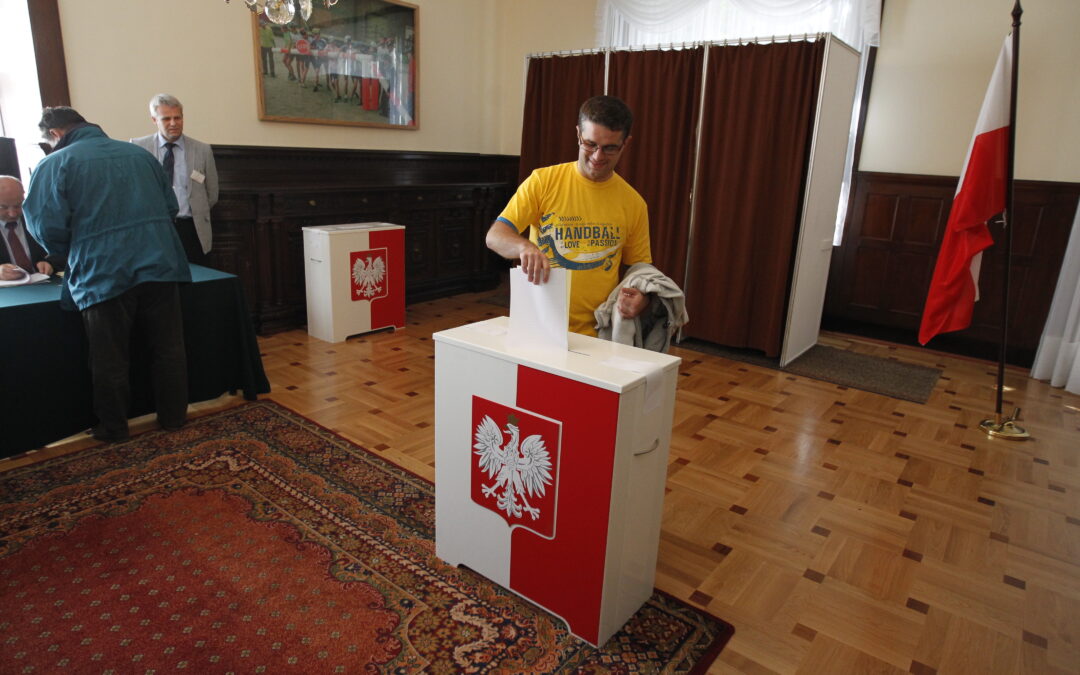Poland’s commissioner for human rights, Marcin Wiącek, has called for changes to new rules on counting overseas votes that he warns violate the constitution and could disenfranchise Poles voting abroad in this year’s elections. The opposition has also voiced concern about the issue.
In January, the ruling party pushed through controversial changes to the electoral code, which were then signed into law by the president in March. Most attention focused on new requirements to provide free transport for elderly voters on election day and the creation of more polling stations in rural areas.
However, another element of the new legislation was a deadline for electoral commissions in overseas polling districts to submit their counts within 24 hours of the end of voting. If they do not, the vote in that district is considered null and void. No such time limit exists for districts in Poland itself.
The president has approved changes to the electoral code that increase the number of polling stations and provide free transport for elderly voters.
The opposition claims the move is intended to increase turnout among groups that support the ruling party https://t.co/FiFSypzy2j
— Notes from Poland 🇵🇱 (@notesfrompoland) March 14, 2023
This requirement “violates the essence of the electoral law” and the constitution, which “does not differentiate the right to participate in elections depending on the place of residence”, wrote Wiącek yesterday in an appeal to the speakers of the two houses of parliament to address the issue.
He notes that the changes “make the validity and effectiveness of the vote dependent on circumstances that are beyond the control of the citizen themself and are due to problems with the efficiency of the electoral administration or from restrictions arising from foreign law”.
Wiącek argues that the new provisions violate the constitutional requirement that “any limitation upon the exercise of constitutional freedoms and rights may be imposed only…when necessary for the protection of security or public order, the natural environment, health or public morals, or the freedoms and rights of other persons”.
Komisje wyborcze w zagranicznych obwodach głosowania mają 24 godziny od zakończenia głosowania na policzenie głosów. Jeśli w tym czasie nie przekażą wyników głosowania do komisji okręgowych, to głosowanie w tych obwodach uważa się za niebyłe.
1/4 pic.twitter.com/VBkebD54K1
— Biuro Rzecznika Praw Obywatelskich (@BiuroRPO) April 18, 2023
The commissioner noted that during Poland’s last elections – to choose a new president in 2020 – almost 520,000 of the 30.3 million votes in the second-round runoff were cast overseas. Polish citizens in 87 foreign countries exercised their right to vote.
“The work and analysis of [my] office clearly show that overseas constituencies are very vulnerable to various organisational and technical problems in the voting process, as exemplified by the recent elections, which were the subject of numerous complaints by citizens to the commissioner,” he added.
Among overseas votes in 2020, a large majority (73%) went to opposition candidate Rafał Trzaskowski in the second round while the incumbent, Andrzej Duda, who was supported by the ruling party, received 27%. However, when including votes in Poland itself, Duda won the election with 51%.
Jak głosowali Polacy za granicą? Onet przygotował grafiki, dzięki którym łatwiej się połapać!
Możemy zaobserwować, że Duda wygrywa w państwach na wschód od Polski (Ukraina, Białoruś, Łotwa) ale reszta należy do Trzaskowskiego! W Ameryce zdecydowanym zwycięzcą jest PAD, w Azji RT pic.twitter.com/N6DGnwRmrm— natalia (@nattaliemm) June 30, 2020
Concern over the new deadline for counting votes abroad was also earlier raised by politicians from Poland’s largest opposition party, Civic Platform (PO).
“We have conducted a simulation of voting in London,” Krzysztof Lisek, who was a coordinator for Trzaskowski’s 2020 campaign, told the Rzeczpospolita daily last month.
“Committees will count at the rate of 100 votes per hour,” said Lisek. “This means that some [votes] will be lost abroad, because the law requires that the counts are produced there after just 24 hours. And there are thousands of votes to be counted,”
In response to questions last month from Notes from Poland, the Polish embassies in London and Ottawa said that they were looking at the possibility of adjusting the voting process to fit within the new statutory time limit, for example by increasing the number of committees. Other embassies, however, refused to comment
Almost half (47.3%) of Poles fear that this autumn's elections could be falsified, finds a poll.
Among government supporters, only 16% are concerned but almost 70% of opposition and undecided voters are worried https://t.co/sRxzD4AK7V
— Notes from Poland 🇵🇱 (@notesfrompoland) January 13, 2023
Main image credit: JAROSLAW KUBALSKI / Agencja Wyborcza.pl

Alicja Ptak is deputy editor-in-chief of Notes from Poland and a multimedia journalist. She has written for Clean Energy Wire and The Times, and she hosts her own podcast, The Warsaw Wire, on Poland’s economy and energy sector. She previously worked for Reuters.




















